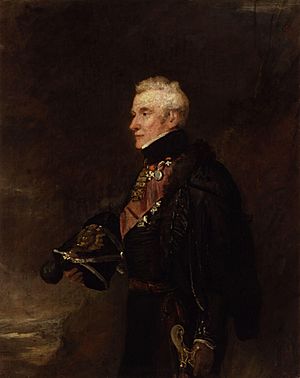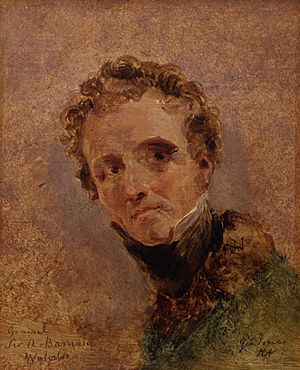Andrew Barnard facts for kids
Quick facts for kids
Andrew Barnard
|
|
|---|---|
 |
|
| Born | 1773 Fahan, County Donegal, Ireland
|
| Died | 17 January 1855 |
| Occupation | British Army |
General Sir Andrew Francis Barnard GCB GCH (1773 – 17 January 1855) was a brave Irish officer in the British Army. He served in many important places around the world, like the West Indies, Canada, and Europe. He fought in the Napoleonic Wars, including the famous Battle of Waterloo. For his courage and service, he received many awards. After his active military days, he took on several civilian roles. He was promoted to a full general four years before he died.
Contents
Sir Andrew Barnard's Life
Andrew Barnard was born in 1773 in Fahan, a place in County Donegal, Ireland. His father was Reverend Dr. Henry Barnard.
Joining the Army
Andrew Barnard started his army career in Scotland in August 1794. He joined the 90th Regiment of Foot. He quickly moved up the ranks, becoming a lieutenant in September and a captain in November of the same year.
He served in St. Domingo (now Haiti) for a few months in 1795. Then, he joined the 55th Regiment. He was part of an expedition to the West Indies in 1796. There, he helped capture a place called Morne Fortune.
In 1799, he took part in the Anglo-Russian invasion of Holland. He was involved in several battles there. In December 1799, he joined the 1st Regiment of Footguards, now known as the Grenadier Guards. He became a major in 1805. He went to Sicily with the guards in 1806.
In 1808, he became a lieutenant-colonel. He was sent to North America to inspect the militia. He returned to England in 1809.
Fighting in the Napoleonic Wars
In 1810, Andrew Barnard joined the famous 95th Rifles. He took command of their 3rd battalion. In July 1810, he sailed to Cadiz, Spain, which was under attack by French forces.
He showed great bravery in many major battles:
- The Battle of Barrosa, where he was wounded twice.
- The sieges of Ciudad Rodrigo and Badajoz in 1812.
- The battle of Salamanca and battle of Vittoria.
After the capture of Badajoz, he moved to command the 1st battalion. In 1813, he became a colonel. He fought at the storming of San Sebastián. He was severely wounded again at the battle of Nivelle, where he was shot through the lung. He also fought at the battle of Orthez and Toulouse. For his service in Spain and Portugal, he received a special gold cross and four clasps.
In 1814, Sir Andrew Barnard was given command of the 2nd brigade of the famous Light Division.
When fighting against Napoleon started again in 1815, Sir Andrew went to Ostend and then to Brussels. He was present at the battle of Quatre Bras. He was also slightly wounded at the epic Battle of Waterloo. For his actions in this campaign, he received awards from Russia and Austria. The Duke of Wellington thought highly of him. After Paris surrendered, the Duke made him the commander of the British forces occupying the French capital.
Later Life and Honors
Sir Andrew received many honors and important positions:
- In 1821, King George IV made him a "groom of the bedchamber."
- In 1828, he became an equerry to the King.
- He also served as clerk-marshal in the royal household for King William IV.
- For many years, he was clerk-marshal to Queen Adelaide.
He continued to rise in military rank:
- He became a major-general in 1819.
- In 1822, he became the Colonel of the Rifle Brigade.
- He was promoted to lieutenant-general in 1837.
- In 1849, the Duke of Wellington appointed him lieutenant-governor of Chelsea Hospital.
- He reached the full rank of general in 1851.
Sir Andrew also received honorary degrees and was a governor of the Royal Academy of Music. He was made a Knight of the Hanoverian Guelphic order in 1819 and a grand cross in 1833. He became a Knight Grand Cross of the Bath in 1840.
The Barnard River in New South Wales, Australia, was named after him by the explorer Thomas Mitchell.
Death
Sir Andrew Francis Barnard passed away in Chelsea on 17 January 1855. Before his funeral, the old soldiers from Chelsea Hospital who had served under him in the Peninsular War were allowed to see his body. After they left the room, it was found that his coffin was covered with laurel leaves. Each soldier had quietly brought a leaf and placed it on the body of their respected leader.
 | Madam C. J. Walker |
 | Janet Emerson Bashen |
 | Annie Turnbo Malone |
 | Maggie L. Walker |


